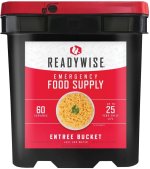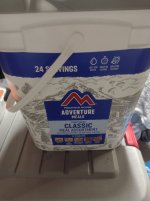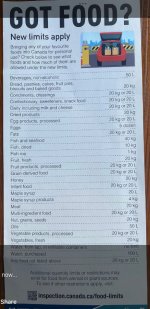-
Happy Publication of "Happy Birthday to You" (1924)!🎶🎂
You are using an out of date browser. It may not display this or other websites correctly.
You should upgrade or use an alternative browser.
You should upgrade or use an alternative browser.
New food limits for personal use when entering Canada
- Thread starter Robin
- Start date
Thanks for sharing that Robin. I’m not heading to Canada this year but hear others are.
Jim
Jim
I wonder if freeze dried meals count as dried products or multi-ingredient foods.
Regardless, 20 kg of "dried products" is 44 lbs! That is a lot of "Big Bill's Rice and Beans". A quick search led me to this - 7.5 lbs of food, enough for one person for 30 days ...and why would anyone other than folk from Vermont want to bring more than 250mL of maple syrup into Canada let alone 20L?
...and why would anyone other than folk from Vermont want to bring more than 250mL of maple syrup into Canada let alone 20L?
Shop local and small scale, process your own, spend money where you are and where you go. It all helps.
 ...and why would anyone other than folk from Vermont want to bring more than 250mL of maple syrup into Canada let alone 20L?
...and why would anyone other than folk from Vermont want to bring more than 250mL of maple syrup into Canada let alone 20L?Shop local and small scale, process your own, spend money where you are and where you go. It all helps.
- Joined
- Aug 10, 2018
- Messages
- 2,177
- Reaction score
- 7,349
That's the one that caught my eye too. Kinda like packing freeze-dried walleye isn't it?...and why would anyone other than folk from Vermont want to bring more than 250mL of maple syrup into Canada let alone 20L?
Now, hickory syrup... I could (maybe) see that as it would be harder to find locally- tough to get here unless you DIY. (I'm still not portaging 20L of it though)
I've mentioned this before. For the first ever Yukon River 1000 mile race in 2009, the race organizers required that each racer must begin the race with 20Kg of food on board for each paddler!! You could not count the weight of water to make dry food edible. An externally unsupported race by the rules, you could not be provided along the way with additional food (or anything else). Each boat was checked for all required equipment and reasonable food stores before being allowed to start. Some officials thought average boats might take 2 weeks to complete, plus a third week for any possible emergency rescue. We finished in just six days.Regardless, 20 kg of "dried products" is 44 lbs!
I raced that year in a 34’ voyageur canoe with seven paddlers. I spent the prior months home dehydrating and packaging all of our high calorie breakfast and dinner meals for seven paddlers that we heated water for onboard and prepared and ate without the need to go ashore during our allowed maximum of 18 hrs./day of paddling on the river (which we did to the very last minute). It all had to be carried across the border into Canada with our boat; we had no issues then.
Rules also required that all food be carried in certified bear resistant canisters. We used a very large 120L Yeti locked chest to hold it all. In the end, after six days of racing on the river, no one went hungry, but we consumed only about 1/4-1/3 of the total amount. That was the one and only and last year of that food requirement rule for the Y1K. The next time we raced, I prepared and we carried food for only up to ten days supply, six days again to finish.
Recently got back from a 2 week trip to the southern end of Savant Lake ON. Upon crossing the border at Pigeon River we were questioned about how much food we were bringing in. The Canadian border agent was fine with our reply that we had 2 weeks of food with us.
Regardless, 20 kg of "dried products" is 44 lbs! That is a lot of "Big Bill's Rice and Beans". A quick search led me to this - 7.5 lbs of food, enough for one person for 30 daysView attachment 148275...and why would anyone other than folk from Vermont want to bring more than 250mL of maple syrup into Canada let alone 20L?
Shop local and small scale, process your own, spend money where you are and where you go. It all helps.
The issue I see isn't weight, it's bulk. For instance, this container says it contains 1.4 kg, but it measures out to about 27 liters. If they count it as dried products, no problem. But if they count it as mixed, maybe not? It's not abundantly clear to me.

The issue I see isn't weight, it's bulk. For instance, this container says it contains 1.4 kg, but it measures out to about 27 liters. If they count it as dried products, no problem. But if they count it as mixed, maybe not? It's not abundantly clear to me.
View attachment 148278
From experience, if they even check, they will go off the actual food volume. Otherwise, the blue barrel crowd would be getting turned away left and right. Now, show up with a shrink-wrapped pallet of sale-ready containers....
The rule is intended to prevent Canadian camps/outposts/towns/retailers, etc. from being resupplied or fortified with foreign foodstuffs and encourage long-term visitors to contribute to the local economy.
seems pretty obvious to me, that food is usually measured as "dry" weight, as opposed to say Bloody caesar mix which comes in bottles and is measured by volumeThe issue I see isn't weight, it's bulk. For instance, this container says it contains 1.4 kg, but it measures out to about 27 liters. If they count it as dried products, no problem. But if they count it as mixed, maybe not? It's not abundantly clear to me.
View attachment 148278
That makes sense to me. As long as the rule is reasonably applied as @Tryin' has experienced. It would be my luck to have to deal with "that one guy" though.seems pretty obvious to me, that food is usually measured as "dry" weight, as opposed to say Bloody caesar mix which comes in bottles and is measured by volume
I remember Uncle Phil of the Wabakimi Project telling me he ordered his FD food directly from Mountain House in Oregon and had it shipped to Rydens (gas station, small duty free shop carrying tobacco and booze, tourist souvenirs and some outdoor gear) on Hwy 61 just south of the Canadian/US border in northeastern Minnesota. He found he gained significant savings this way as opposed to having his huge food order shipped to him in Canada. The drive from his home in Thunder Bay to Rydens was about 45 minutes each way.
Rydens apparently acts as a place to drop ship packages for Canadians as their back room is lined with large shelves filled with packages for pickup. And many Canadians drive down from Thunder Bay to gas up.
Rydens apparently acts as a place to drop ship packages for Canadians as their back room is lined with large shelves filled with packages for pickup. And many Canadians drive down from Thunder Bay to gas up.
Similar threads
- Replies
- 12
- Views
- 977
- Replies
- 10
- Views
- 1K
- Replies
- 6
- Views
- 1K

